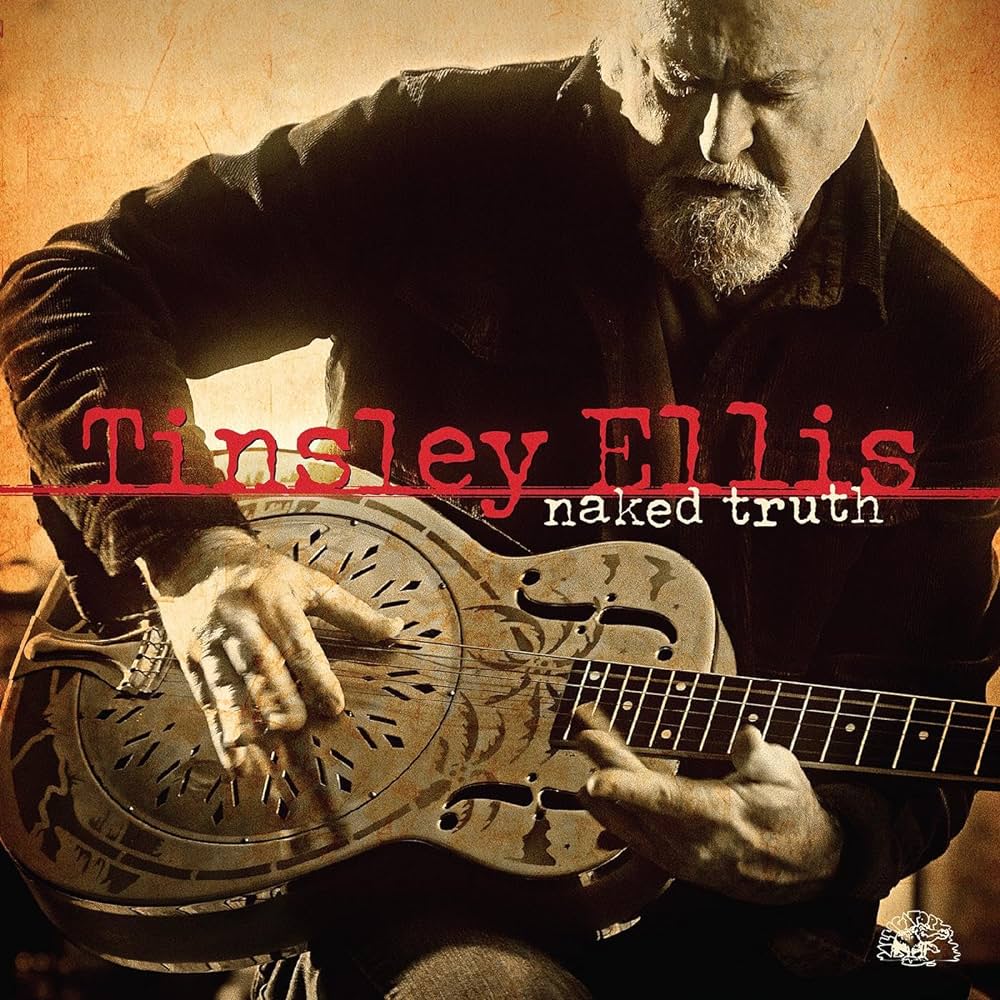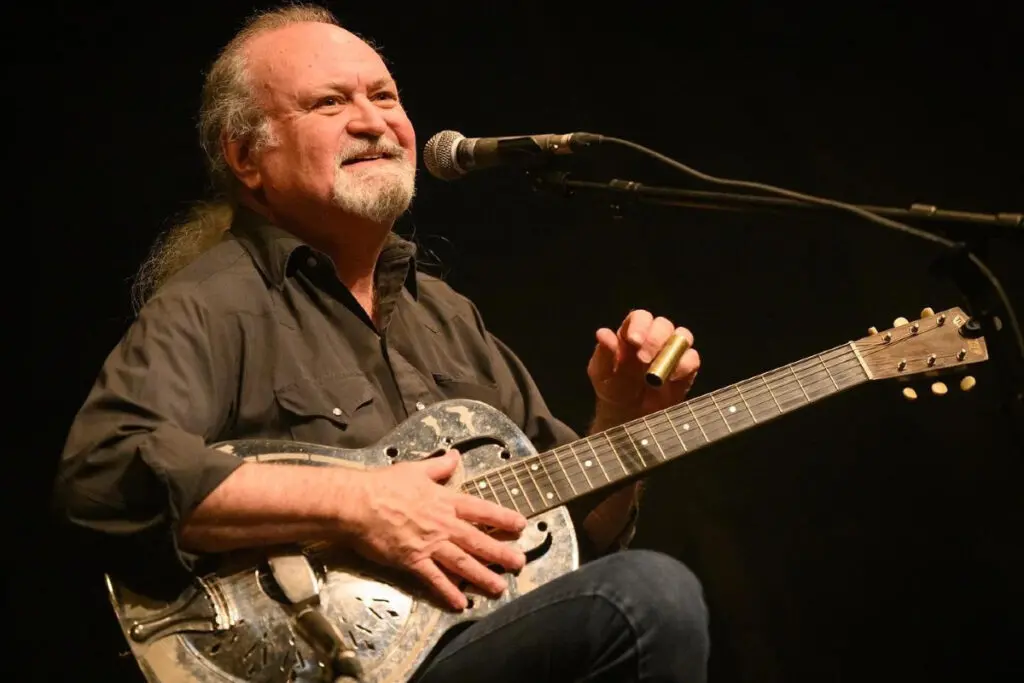Tinsley Ellis’ new album, Naked Truth, is proof that a veteran blues road warrior can learn new tricks. For decades he’s travelled the world playing clubs and theaters, laying down crash and burn electric guitar that should make Eric Clapton jealous. Naked Truth is the yin to that yang. If the liner notes didn’t credit him as songwriter on all 12 songs with titles like “Devil in The Room,” “Hoochie Mama,” and “Grown Ass Man” You’d think they were long lost recordings by legacy Delta blues men like Son House or Mississippi John Hurt.

It’s not like he hasn’t included acoustic blues numbers in his live sets, but to dive headlong into the genre is frankly a surprise to me, and I’ve been following him ever since he appeared on my radio show in 1991 when I put on one of his cuts, and he suddenly jumped up and ran out of the studio. He wanted to hear the way it would sound to his fans cruising the highway.
“Now I’ve gotten used to it, but that was a time when I was starting to get some airplay. The name of the song you were playing was called ‘The Axe Is Gonna Fall,’ and I remember going outside. I sat in my van. We listened to it on the radio. It’s a real long song.”
Acoustic blues in some ways is very different from electric blues. There is a simple beauty to it. If blues is the truth, as Willie Dixon said, the best acoustic blues reveals those truths in primal ways that connect with the listener fundamentally. Tinsley is able to channel those truths on this record.
“When it comes to roots music and blues, less is more, and I wrote some of these songs on this album as I was singing them. And the others were written faster than I could record them. In other words, I start out on a piece of paper. ‘Devil in The Room’ I wrote in less time than it takes to sing the song. I store a lot of songs in my cell phone. If I hear an idea that I like, I put it in my cell phone. I’m looking at it right now. I’ve got about 40 song titles. I’ve got one song title that says, ‘I tested negative for sympathy for you.’ At night, I look down the list of titles. Usually I come up with a guitar riff first and pick the lyrics to go with it. And sometimes I’ll be in a sound check, and I’ll be playing something. and I go, ‘That’s cool.’ I have a recorder on the phone. Then, I’ll create a lick. ‘Grown Ass Man’ started with a cell phone like that I played the night I put that together with the song title I had in song titles.
“‘Grown Ass Man’ is an expression people would say. Authority figures in my life say, ‘You used to be something. You’re a grown ass man now.’ Yeah, I mean people like me play blues, it oughta at least be funny, you know. There’s no shortage of sorrow. There’s something else that’s the other side of the coin.”
Tinsley is constantly on tour. Right now, for the first time he’s taking with him the Martin acoustic guitar his father gave him. “I’ve had a lot of work done on it. My dad gave me that guitar when I graduated from high school. That would have been in late ’74 or ‘75 which is the year I graduated, and Dad bought me that guitar as a graduation present.
“That’s the guitar I’ve written a lot of my songs on because I tend to write on acoustic guitar, something you do by yourself. So, it’s fun playing those songs every night. I talk (in concert) about how I wrote ’em and where I get the inspiration for a song musically, playing guitar on the one they were written on is kinda cool.”
Tinsley and I have become friends over the years, and our interviews are rambling conversations rather than straight Q&A. One of those rambles this time was about Marshall Chess and his releasing an album that combines blues and hip hop. “Somebody once said, ‘Whoever combines the folk stylings of blues with hip hop beat will be the next B. B. King because pop culture is definitely driven by two elements, youth and image which means I’m screwed.’”
I reminded Tinsley that he says that but the older he gets the more he looks the part of a grizzled bluesman. “Yeah, but I mean if you really want to appeal to the people who go out and buy the music or even buy an LP, that’s gonna have to be a much younger crowd, and they tend to like the guitarists of the same age. I mean I’m no longer the voice of youth rebellion.”
Tinsley once told me that touring was 22 hours of hell a day but that the two hours on stage is why he does what he does. “It would be nice if they actually invent that thing they have on Star Trek where they beam you up. I’m laying on my sofa and the next minute I’m backstage at a venue. Then, after the show, I get beamed back to my sofa, but that’s not gonna happen in my lifetime. That’s what show business is, a lot of sittin’ round and sound checking, and you can only eat so much… And it would be nice to sleep a little longer and maybe to drive shorter, but it’s a big world. That’s for sure.”
Music journalism has made a 180-degree turn in my lifetime. Used to be the interviewer kept a certain distance from his subject to be objective. Social media has changed all that. I love my relationship to artists like Tinsley and make no bones about it.
“It’s really about relationships, isn’t it, in everything,” he says. “It just is. I’m just glad I get along with everybody ’cause when I don’t get along with people and go sideways in business with them, I gotta find a way to make those amends, and then I can have it not eating at me. I’m happy to say I’m getting along with everybody, but that’s right now. That’s subject to change. You can only be young once. You can be immature forever.”

